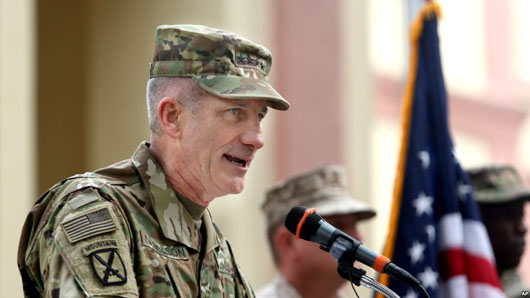by WorldTribune Staff, August 23, 2018
U.S. President Donald Trump’s strategy in Afghanistan “is fundamentally working and advancing us towards reconciliation,” the commander of U.S. forces in Afghanistan said on Aug. 22.
Ditching the Obama administration’s timeline for withdrawal and gaining commitments from NATO allies to extend assistance to 2024 were key moves made by Trump, said Army Gen. John Nicholson.

“This has affected the enemy’s calculus. And this is one of the contributing factors to why they’re now willing to begin talking about an end of the war,” Nicholson said.
Nicholson, who is stepping down after commanding U.S. forces in Afghanistan since 2016, faulted the Obama administration’s approach.
“In the time that I joined this mission as the last commander appointed by President Obama, we were on a glide path to reduce our forces and eventually to close down the mission,” he said. “And so, at that time, the enemy had no incentive to negotiate because we were leaving. So in war, which is a contest of wills, the enemy believed that we had lost our will to win and that all they needed to do was wait us out.”
Nicholson added he believes Trump’s South Asia Strategy “is the right approach. And now we see that approach delivering progress on reconciliation that we had not seen previously. And I think that was because we clearly communicated to the enemy they could not wait us out. We were backed up by our allies.”
Nicholson said that within six months of Trump announcing his new Afghanistan strategy, there were two peace offers, one in the form of an open letter from the Taliban to the American people, and the second from Afghanistan President Ashraf Ghani.
Earlier this summer, ten months after Trump’s strategy announcement, Afghanistan held its first nationwide ceasefire in 17 years.
Nicholson said Ghani has now offered a second nationwide ceasefire that could last through Nov. 20.
“Ultimately, wars end with a political settlement. So the progress towards reconciliation is key. And the fact that we had been able to make this kind of progress [is] significant,” Nicholson told reporters at the Pentagon on Aug. 22 in his last briefing as the top U.S. commander in Afghanistan.
“We have an unprecedented opportunity for peace now,” said Nicholson. “So the progress towards reconciliation, which ultimately is what we want … which will enable a political end to the war, is perhaps one of the greatest successes of the strategy so far.”
Nicholson, who has commanded U.S. forces in Afghanistan since 2016, will be replaced by Army Lt. Gen. Scott Miller.
Nicholson said that more than 250 jihadists from the Afghanistan affiliate of Islamic State (ISIS) and their family members recently surrendered to Afghan forces in Jawzjan in Northern Afghanistan, eliminating one of three “pockets” of ISIS in Afghanistan.
He also dismissed the Taliban’s efforts to seize two provincial capitals, calling them failed attempts. “Can they conduct attacks? Yes. Can they hold what they take? No.”
Nicholson said there could be further setbacks, but expressed confidence in the peace process.
“Now, there will be ups and downs, there will be leap-aheads, there’ll be frustrations, there’ll be, you know, two — two steps forward, one step back from time to time, but the process is started,” he said.
Subscribe to Geostrategy-Direct __________ Support Free Press Foundation
